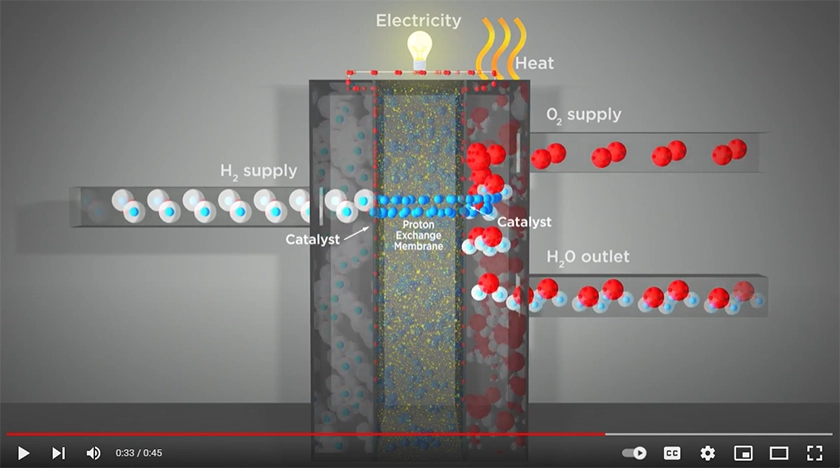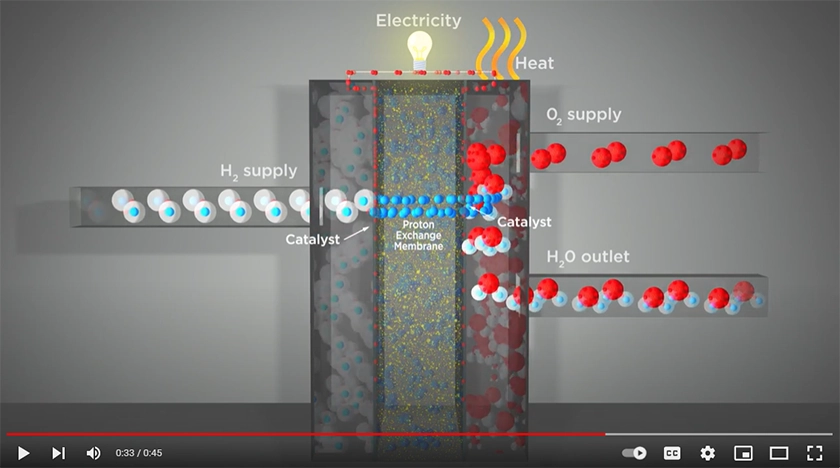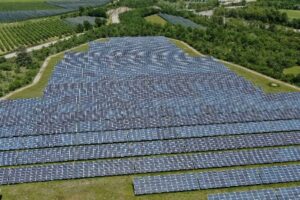PEM Fuel Cells 101: How They Work and Why They Matter

PEM (Proton Exchange Membrane) fuel cells are a key part of the growing movement towards clean energy solutions. Unlike traditional energy sources that rely on burning fossil fuels, PEM fuel cells use hydrogen and oxygen to generate electricity electrochemically, producing only water and heat as by-products. This makes them one of the cleanest energy technologies available today.
PEM fuel cells are used in a wide range of industries, from powering electric vehicles to supplying energy for industrial operations. They are known for their efficiency, reliability, and ability to reduce harmful emissions. As concerns about climate change and environmental sustainability grow, the focus on such technologies has never been more important.
In this blog, we will take a detailed look at how PEM fuel cells work, their applications, and the advantages they offer over other technologies. We will also discuss some challenges they face and what the future holds for these innovative energy solutions. Whether you are new to fuel cells or already familiar with them, this guide will provide valuable insights into why PEM fuel cells are becoming a popular choice in the energy landscape.
How PEM Fuel Cells Work
At the heart of PEM fuel cells is a simple yet powerful process that converts chemical energy into electrical energy. To understand how they work, let’s break down the basic components and steps involved.

PEM fuel cells consist of three main parts: the anode, the cathode, and the proton exchange membrane. The process begins when hydrogen gas is fed into the anode side of the fuel cell. Here, a catalyst (usually made of platinum) helps split the hydrogen molecules into protons (positively charged particles) and electrons (negatively charged particles).
The proton exchange membrane (PEM) is crucial because it allows only protons to pass through while blocking the electrons. This forces the electrons to travel through an external circuit, creating an electric current. This current can then be used to power devices, vehicles, or even homes.
Meanwhile, the protons travel through the membrane to the cathode side, where they combine with oxygen from the air and the electrons that traveled through the circuit. This reaction produces water and a small amount of heat as by-products. The entire process is clean and efficient, making PEM fuel cells an attractive option for reducing carbon emissions and promoting sustainability.
One of the key advantages of PEM fuel cells is their ability to start up quickly and operate at relatively low temperatures compared to other types of fuel cells, usually around 80 degrees Celsius. This makes them ideal for applications like electric vehicles, where quick startup and high efficiency are essential. Additionally, PEM fuel cells can be scaled up or down to suit different needs, from powering small electronics to large industrial equipment., usually around 80 degrees Celsius. This makes them ideal for applications like electric vehicles, where quick startup and high efficiency are essential. Additionally, PEM fuel cells can be scaled up or down to suit different needs, from powering small electronics to large industrial equipment.
In summary, PEM fuel cells work by splitting hydrogen into protons and electrons, generating an electric current and combining the protons with oxygen to produce water. It’s a clean, efficient, and scalable technology that holds great promise for the future of energy.
Applications of PEM Fuel Cells
PEM fuel cells have a wide range of applications due to their versatility, efficiency, and clean energy production. From transportation to stationary power generation, these fuel cells are being used in various industries to support the shift towards sustainable energy solutions. Let’s explore some of the most common and emerging applications of PEM fuel cells.
Transportation
One of the most promising uses for PEM fuel cells is in the transportation sector. These fuel cells are already being used to power hydrogen-fueled vehicles, such as cars, buses, trucks, and even trains. Vehicles powered by PEM fuel cells emit only water vapor, making them an environmentally friendly alternative to traditional gasoline or diesel-powered vehicles.
Fleet vehicles, in particular, benefit from PEM fuel cells as they can return to the yard for refueling, a key advantage while the hydrogen fueling infrastructure is still being developed. Additionally, refueling hydrogen tanks takes only a few minutes, offering faster turnaround times compared to battery-electric vehicles.
PEM fuel cells are especially well-suited for heavy-duty vehicles like buses and trucks, which require long-range capabilities and quick refueling times. Several cities around the world are already incorporating hydrogen-powered buses into their public transportation fleets, reducing air pollution and greenhouse gas emissions.
Material Handling
PEM fuel cells are also making a significant impact in the material handling industry. Hydrogen-powered forklifts are becoming increasingly common in warehouses, factories, and distribution centers. In fact, in the U.S. approximately 30% of food is moved in warehouses using fuel cell –powered forklifts. Unlike traditional battery-powered forklifts, hydrogen fuel cell forklifts do not require lengthy recharging times. Coupled with 100% power throughout a shift, this allows businesses to keep their operations running smoothly with minimal downtime. Moreover, PEM fuel cells produce no harmful emissions, making them ideal for indoor environments where air quality is a concern.

Stationary Power
PEM fuel cells are also used for stationary power applications, including backup power systems for buildings, railway sensors, data centers, and telecommunication towers. These systems provide a reliable and clean source of energy, especially in situations where uninterrupted power is critical. Unlike diesel generators, which produce hazardous emissions, PEM fuel cells offer a cleaner alternative for backup power solutions.

Emerging Applications
In addition to these established uses, researchers are exploring new ways to utilize PEM fuel cells in residential and commercial settings, such as home heating systems and microgrids. As technology advances, we can expect PEM fuel cells to become even more integrated into our daily lives.
Advantages of PEM Fuel Cells
PEM fuel cells offer several advantages that make them a compelling choice for clean energy solutions across various sectors. Let’s explore some of the key benefits that set them apart from other energy technologies.
High Efficiency
One of the main advantages of PEM fuel cells is their high efficiency. Unlike traditional combustion-based engines, which convert only a fraction of the energy in fuel into usable power, PEM fuel cells can achieve efficiency levels of 40% to 60% when generating electricity. While other types of fuel cells are also commonly used in combined heat and power (CHP) systems, PEM fuel cells are still a highly efficient solution for electricity generation, making them an effective option for applications where heat recovery is not a priority.
Low Environmental Impact
PEM fuel cells produce electricity through a clean chemical reaction between hydrogen and oxygen, with water being the only by-product. This means they produce no harmful emissions such as carbon dioxide (CO2), nitrogen oxides (NOx), or particulate matter, which are common pollutants from fossil fuel-based energy sources. By using PEM fuel cells, industries and consumers can significantly reduce their carbon footprint and contribute to cleaner air and reduced greenhouse gas emissions.
Quiet Operation
Another advantage of PEM fuel cells is their comparatively quiet operation. While the base technology has no moving parts and is inherently quiet, systems often include cooling fans that generate some noise. However, even with these components, PEM fuel cells are much quieter than conventional combustion engines. This makes them well-suited for applications in noise-sensitive areas like neighborhoods, national parks, and urban environments, where minimizing noise pollution is important.
Scalability and Flexibility
PEM fuel cells are highly scalable, meaning they can be designed for both small and large applications. Whether it’s powering a forklift in a warehouse or providing backup power for a data center, PEM fuel cells can be adjusted to meet different energy demands. This flexibility makes them a versatile solution for a variety of industries.
Challenges and Limitations of PEM Fuel Cells
While PEM fuel cells offer many advantages, there are a few challenges to address for broader adoption. However, ongoing advancements are actively working to overcome these obstacles.
- Cost of Materials: PEM fuel cells often rely on precious metals like platinum as catalysts, which can increase the cost. However, research is continuously improving catalyst efficiency, reducing the need for expensive materials.
- Durability: The proton exchange membrane in PEM fuel cells can degrade over time, especially under high stress. Innovations in membrane materials are already extending their lifespan and improving durability.
- Hydrogen Infrastructure: The availability of hydrogen fueling stations is currently limited. However, governments and industries are making significant investments in expanding hydrogen infrastructure, making it easier to adopt PEM fuel cells in the future.
- Hydrogen Production: Producing hydrogen, especially from renewable sources, can be energy intensive. Yet, newer methods, like using electrolysis powered by renewable energy, are making hydrogen production greener and more efficient.
Each of these challenges presents an opportunity for growth, and advancements are continually being made to address them.
Innovations and Future of PEM Fuel Cells
PEM fuel cells have come a long way in recent years, thanks to continuous innovations in technology and materials. As the world shifts towards cleaner energy, the future of PEM fuel cells looks brighter than ever. Let’s explore some of the key innovations and emerging trends shaping the future of PEM fuel cells.
1. Advancements in Catalyst Technology
One of the biggest hurdles in making PEM fuel cells more affordable is the cost of platinum-based catalysts. However, recent innovations have led to the development of alternative catalyst materials. Researchers are finding ways to reduce the amount of platinum required, or even replace it with more cost-effective metals. These breakthroughs are helping to lower production costs, making PEM fuel cells more accessible for widespread use.
2. Enhanced Durability
PEM fuel cells are being engineered to last longer, with improved membrane materials that resist degradation. New membranes are designed to withstand the high temperatures and stresses that occur during operation, helping to extend the lifespan of the fuel cell. This means that PEM fuel cells are becoming more reliable for long-term use, whether in vehicles or stationary power systems.
3. Hydrogen Production from Renewable Sources
The future of PEM fuel cells depends on the availability of clean hydrogen. Fortunately, innovations in hydrogen production are making it easier to produce hydrogen from renewable energy sources like wind, solar, and hydroelectric power. Electrolysis, the process of splitting water into hydrogen and oxygen, is becoming more efficient and cost-effective. This ensures that PEM fuel cells can operate sustainably, using hydrogen that is produced with minimal environmental impact.
4. Integration with Grid Systems
Another exciting trend is the integration of PEM fuel cells into grid systems for power generation and storage. As renewable energy sources like solar and wind become more prevalent, PEM fuel cells can play a role in storing excess energy and providing backup power during periods of high demand. This helps create a more resilient and reliable energy grid, reducing the need for fossil fuel-based power plants.
5. Growth in Transportation Applications
The transportation sector is poised to benefit greatly from advancements in PEM fuel cell technology. As hydrogen refueling infrastructure expands and vehicle manufacturers continue to develop hydrogen-powered cars, trucks, and buses, PEM fuel cells are expected to play a major role in the future of transportation. The quick refueling times and long-range capabilities of PEM fuel cells make them ideal for heavy-duty vehicles and long-distance travel.
Conclusion
PEM fuel cells are a promising technology that offers a clean, efficient, and scalable solution for the world’s growing energy needs. From transportation to stationary power and industrial applications, their versatility and environmental benefits make them a key player in the transition to a more sustainable future.
While there are challenges like cost and hydrogen infrastructure, ongoing innovations are addressing these issues, making PEM fuel cells more accessible and durable. Additionally, government incentives help to level the playing field against incumbent technologies.As advancements continue, we can expect PEM fuel cells to play a larger role in reducing carbon emissions and promoting energy independence.
The future of PEM fuel cells is bright, with the potential to revolutionize the way we generate and use energy. Whether it’s through powering electric vehicles, supporting renewable energy grids, or providing backup power, PEM fuel cells are set to become an integral part of the clean energy landscape.
References
- Fuel Cells: What They Are and How They Work
Plug Power - Fuel Cell Applications 101: Where Are Fuel Cells Used Today?
Plug Power - Fuel Cell Efficiency 101: The Key Metrics
Plug Power - Fuel Cells in Transportation: Driving the Future of Sustainable Mobility
Plug Power - Fuel Cell Benefits: 5 Facts You Should Know
Plug Power - Comparison of Fuel Cell Technologies Department of Energy
- Polymer Electrolyte Membranes for High-Temperature Fuel Cells
Tech Xplore - Fuel Cell Durability Research
SciTechDaily - Next-Generation PEM Fuel Cells for Carbon Neutrality
Cell.com






